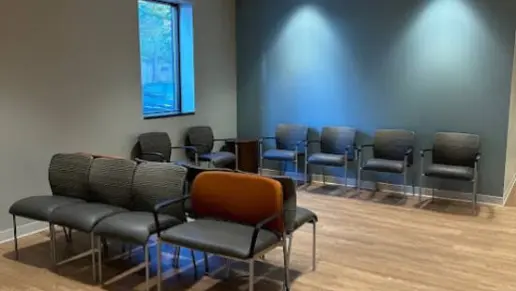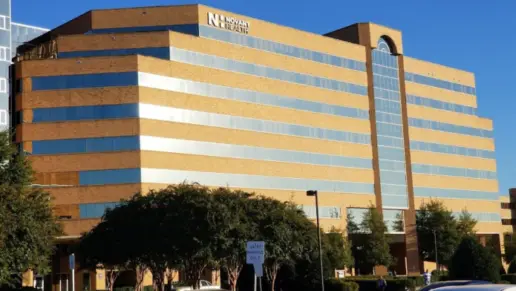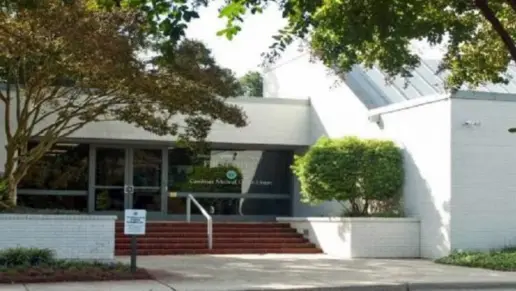Its difficult get contact whit someone for making an appointment, the Place needs better management urgently, you can't get the help that you need here, it is unprofessional.
About New Beginnings Counseling Services
New Beginnings Counseling Services - South Horner Boulevard offers outpatient treatment for individuals with alcohol and/or substance addiction. The program includes individual counseling, group therapy, family support and more. New Beginnings Counseling Services - South Horner Boulevard is located at Sanford, North Carolina.
At New Beginnings Counseling Services – South Horner Boulevard they offer a safe, nurturing environment to their consumers to help promote positive change by providing different types of therapies to help them realize their potential and to, most importantly, alleviate the barriers that have interfered with their ability to adequately perform in the home, school or community settings. NBCS will collaborate with family members and other natural support systems, including other helping professionals to ensure that the best needs of the consumer is adequately met.
All services provided by New Beginnings Counseling Services – South Horner Boulevard are governed by licensed professionals, including a licensed medical doctor who specializes in child/adult psychiatry and a licensed substance abuse counselor with the North Carolina Substance Abuse Program. Remember at NBCS our goal is to “Promote Healthy Lives” by making every effort to target the identified needs of their consumers.
Latest Reviews
Rehab Score
Accepted Insurance
Other Forms of Payment
Medicaid is a state based program that helps lower-income individuals and families pay for healthcare. Medicaid covers addiction treatment so those enrolled can use their coverage to pay for rehab. When a program accepts Medicaid the client often pays very little or nothing out of their own pocket.
Private insurance refers to any kind of healthcare coverage that isn't from the state or federal government. This includes individual and family plans offered by an employer or purchased from the Insurance Marketplace. Every plan will have different requirements and out of pocket costs so be sure to get the full details before you start treatment.
Self-pay involves paying for treatment out of your own pocket. You can use savings or credit, get a personal loan, or receive help from family and friends to fund your treatment. If you don't have insurance or your insurance plan doesn't cover a specific program, self-pay can help ensure you still get the care you need.
Sliding scale payments are based on a client's income and family size. The goal is to make treatment affordable to everyone. By taking these factors into account, addiction recovery care providers help ensure that your treatment does not become a financial burden to you or your family, eliminating one barrier to care.
Medicare is a federal program that provides health insurance for those 65 and older. It also serves people under 65 with chronic and disabling health challenges. To use Medicare for addiction treatment you need to find a program that accepts Medicare and is in network with your plan. Out of pocket costs and preauthorization requirements vary, so always check with your provider.
Military members, veterans, and eligible dependents have access to specific insurance programs that help them get the care they need. TRICARE and VA insurance can help you access low cost or no cost addiction and mental health treatment. Programs that accept military insurance often have targeted treatment focused on the unique challenges military members, veterans, and their families face.
Addiction Treatments
Levels of Care
Treatments
The goal of treatment for alcoholism is abstinence. Those with poor social support, poor motivation, or psychiatric disorders tend to relapse within a few years of treatment. For these people, success is measured by longer periods of abstinence, reduced use of alcohol, better health, and improved social functioning. Recovery and Maintenance are usually based on 12 step programs and AA meetings.
There are many types of drug rehab in North Carolina. To receive treatment for addiction, you can choose from many inpatient and outpatient programs. Often, participants start with detox and work through a full continuum of care that continues with ongoing support for long-term recovery.
Many of those suffering from addiction also suffer from mental or emotional illnesses like schizophrenia, bipolar disorder, depression, or anxiety disorders. Rehab and other substance abuse facilities treating those with a dual diagnosis or co-occurring disorder administer psychiatric treatment to address the person's mental health issue in addition to drug and alcohol rehabilitation.
A combined mental health and substance abuse rehab has the staff and resources available to handle individuals with both mental health and substance abuse issues. It can be challenging to determine where a specific symptom stems from (a mental health issue or an issue related to substance abuse), so mental health and substance abuse professionals are helpful in detangling symptoms and keeping treatment on track.
Opioid rehabs specialize in supporting those recovering from opioid addiction. They treat those suffering from addiction to illegal opioids like heroin, as well as prescription drugs like oxycodone. These centers typically combine both physical as well as mental and emotional support to help stop addiction. Physical support often includes medical detox and subsequent medical support (including medication), and mental support includes in-depth therapy to address the underlying causes of addiction.
Programs



Clinical Services
This type of therapy works on the premise that thinking, questioning and doing, (with practice) leads to the changes needed for recovery. Learning to change the way you think about yourself will result in changing the way you treat yourself. There is an eclectic combination of cognitive, behavioral and emotional techniques: changing negative thoughts to positive and pessimistic words to optimistic words. Using humor, role playing, and homework and word-work in attacking shameful feelings and feelings of guilt are combined with the effort to make changes in thinking and behaviors. The focus with cognitive-behavior therapy is that it is a "move-forward" approach and often lacks exploration of the deeper emotional issues that led to negative behaviors and thoughts in the first place. There can also be Behavior Modification Therapy on its own where as the client focuses on changing behaviors through practice.
Research clearly demonstrates that recovery is far more successful and sustainable when loved ones like family members participate in rehab and substance abuse treatment. Genetic factors may be at play when it comes to drug and alcohol addiction, as well as mental health issues. Family dynamics often play a critical role in addiction triggers, and if properly educated, family members can be a strong source of support when it comes to rehabilitation.
Group therapy is any therapeutic work that happens in a group (not one-on-one). There are a number of different group therapy modalities, including support groups, experiential therapy, psycho-education, and more. Group therapy involves treatment as well as processing interaction between group members.
The ultimate goal of individual therapy is to recover by learning to be more confident in yourself, to make your voice heard through communication, to validate your own emotions, to learn to love yourself, and to learn better ways of coping with anger, sadness and stress. You will spend many hours talking to your therapist about your childhood, your experiences, and your day-to-day life, and all of this is important to your recovery. There are many ways a therapist can work with you individually, and different therapists have different methods. The name of the approach is not as important as the methods used, so it will be important for you to discuss with your therapist your goals in working towards recovery.
Life skills trainings involve all the skills a person must have in order to function successfully in the world. These include time management, career guidance, money management, and effective communication. Truly successful addiction recovery is based on the ability to not only live substance-free, but to thrive. Life skills teaches the practical necessities of functioning in society, which sets clients up for success in life, and therefore sobriety.
Trauma therapy addresses traumatic incidents from a client's past that are likely affecting their present-day experience. Trauma is often one of the primary triggers and potential causes of addiction, and can stem from child sexual abuse, domestic violence, having a parent with a mental illness, losing one or both parents at a young age, teenage or adult sexual assault, or any number of other factors. The purpose of trauma therapy is to allow a patient to process trauma and move through and past it, with the help of trained and compassionate mental health professionals.
Accreditations

The Commission on Accreditation of Rehabilitation Facilities (CARF) is a non-profit organization that specifically accredits rehab organizations. Founded in 1966, CARF's, mission is to help service providers like rehab facilities maintain high standards of care.
CARF Accreditation: Yes
Contact Information
1518 South Horner Boulevard
Suite 900
Sanford, NC 27330



